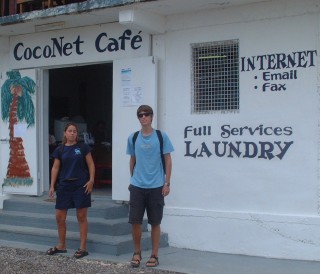
Chris and Amanda outside CocoNet Cafe
|
Pacific Landfalls Tonga Pages Related Pages |
Neiafu, Vava'u
 Chris and Amanda outside CocoNet Cafe |
Population: About 16,000, with a few dozen Palangi (foreigners)
Landscape: Low hills (the town is on a cliff above the harbor)
Visited: Off and on from 19 May until 4 October, 2004
(Sue) The town of Neiafu was our cruising base for 4 and a half months and will always be remembered fondly as the one port so far where we felt most at home and knew the most people ashore. While most of the town perches a few dozen feet above the harbor cliffs, the waterfront housed several businesses which we frequented almost daily. For Internet, we spent many hours at Coconet (advertising itself as having high-speed internet and high-speed laundry) just by the city docks and the public market. Robert, an ex-pat Californian had a mellow personality and seemed happy to spend his days surrounded by friendly customers/friends and his stable of computers.
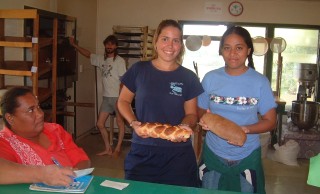 Amanda and Lena at the Lighthouse Cafe |
To the south of that was
Dolphin Pacific Diving
which we joined as "club members" and with whom we had some
wonderful dives.
Farther along were the two yachty bar/restaurants: The Mermaid
and Ana's Cafe. It was here that we usually left the dinghy when we went ashore
to shop, and where you'd find any or all of us on Wednesday night for karaoke,
Friday night for the yacht club race festivities and Tongan dancing, and
Saturday night for the live bands and partying.
Next in line were the three main
charter companies: The Moorings, Sunsail, and Melinda Sea Adventures. We were
friends with most of the staff, and found them personable and helpful,
especially when we hauled Ocelot to work on the engines and bottom. They
also liked how Jon and Chris could help out with their computer needs! Last on
the waterfront was the small marine railway where we
hauled Ocelot, spending a
week replacing engine seals, anodes, and painting the bottom. Up in town (which
was one main street and a couple half-blocks back away from the water) we bought
baguettes at the Austrian Bakery, Lighthouse Cafe, where the Tonga girl, Lena,
was always
happy to see Amanda, or to ask about her if she wasn't with me while shopping. At Pua's
grocery store we found most of the food items we needed, with prices
higher than the US, and even higher than Fr. Polynesia because there is no
government subsidy on staples. The public market was open Mon-Sat and supplied
us with bananas, papaya, eggs, green pepper, onions, potatoes, and sometimes
pineapple and pumpkin.
Neiafu is a small enough town that you soon get known everywhere you go, and
the Tongans are some of the friendliest people we've ever met -- they are always very sincerely
happy to see you.
(Amanda) Wow. With Mom and Dad writing five paragraphs each on average, I'm not sure what else to write about! Neiafu was a very cute 'n' spunky little town (village?) in the sort of way that everyone knows everyone else. Some of the time, this included the cruisers. There were the grocery-store ladies, the bakeries, the tourist shops, the waterfront bars and businesses, and of course all the locals who came down to the Mermaid on Friday and Saturday nights.
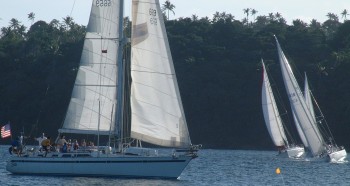 Seven teens raced on Faith one Friday! |
Friday nights (and afternoons, for that matter) are rather special in Neiafu. Every week, care of The Moorings Yacht Charter and a bunch of other sponsors, a yacht-race is held in Neiafu harbor, free to join, with prizes for every boat, no matter what place you make. Sweet as! Of course, we didn't ever race our own boat. Homes are not meant to be raced. Plus, Gary (The Moorings manager) always took out a boat or two, and was readily accepting of crewmembers who actually knew how to sail. Once the season got going a bit more, and more cruisers came in, there were more boats in the races, often looking for crew. Very good! I actually skippered one, a big beautiful sloop named Don Juan, and we got the not-bad place of third. 'Course, if I'd been pointing the boat the correct direction at the start of the race, we might have done better, but oh well. It was fun all around, and I think in four and a half months we managed to rack up a few t-shirts, a few meals and bar-tabs, and a free dive as prizes. Woo-hoo!
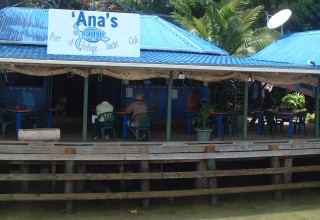 'Ana's put on a great yacht race each Friday followed by Tongan dancing |
Continuing the Friday-night story. After the prize-giving of the race, there were dance-shows at the bars of local dancing (not as energetic or traditionally warlike as the Marquesas, but not bad) followed by a fire-dance done by a local teenager. Not too shabby, but after a few times of seeing the same old dances over and over, it got a bit old. Most of them, if I hear the drumbeat or song, I could do the dances myself! (No, you may not take pictures!) Following that, the two competing waterfront bars set up their competing live bands, and there was music and dancing and drinking (until it ran out) and (occasionally) karaoke until about two in the morning. Windy nights weren't too bad, but on the really airless ones where the sound just blasted over the water, Dad claims he didn't get to sleep until some unbeknownst hour of the morning. Me, as soon as I got home from the par-tay (around 11 - 11:30, dang but I hate curfew!) I just slept like a baby through it all... even the karaoke!
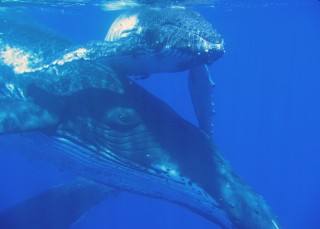 Chris's shot of Humpback mother and calf, taken on a trip with Whalesong |
(Chris) Whatever the original reason for the name
'Friendly Islands', Tongans are definitely among the nicest people I've met.
Everybody says 'Hi' or the local equivalent (which I'm not going to try to
spell, I can barely pronounce it) and waves, most of the people were happy to
talk to and help out strangers, and while foreigners definitely stood out, they
were well respected.
I was always busy in Neiafu; not only did I do much of my
schoolwork there, I began helping people with their computers fairly early in
our visit. As my reputation grew, so did my work hours (and my wallet, which was
nice; I rarely can make much money out here) until eventually I was working the
equivalent of what might have become 40-hour weeks (we usually weren't in Neiafu
that many days, however.)
The
peak of my work came when I was contracted to build a database for the
Whale-Watch Operators Assoc. of Vava'u, a group of something like six local
companies that run commercial whale-watching trips (and often swimming with
whales, Tonga being one of the few countries where it is permitted to do so).
They need the database to help persuade the Tongan royalty and international
community that these whales need protection; the current king has a moratorium
on whaling (the kind with harpoons) but he is elderly and his son is said to be
very interested in the money the Japanese would pay for whaling rights. This
would be a real disaster; when Southern Humpback Whales come up to Tonga is is
to give birth and mate, they are used to boats being around. Because their
breeding grounds are in the shallow waters near the islands, the whalers
wouldn't even make it to open sea before their decks and holds were full (for
the first handful of trips, until only the few most cautious whales were left).
I hope the database does what it's needed for; both for the whales' sakes and
because, after the about 200 hours of planning, research, development, modifications,
and debugging, I want to have reason to be proud of what I've produced.
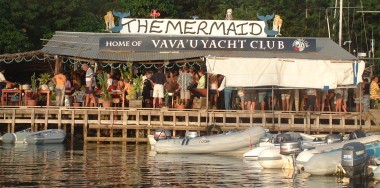 The busy Mermaid Bar was a great yachtie hang-out |
Aside from the races and after-race festivities, which I believe have been well described elsewhere, my favorite activities based in Neiafu were scuba diving with the great folks at Dolphin Pacific Diving and whale watching (including getting in to swim) with the wonderful crew of Whalesong, a custom modified whale-watching boat owned and operated by Sailing Safaris (also the owners of the Mermaid Restaurant, where we enjoyed going for good food and lots of fun.)
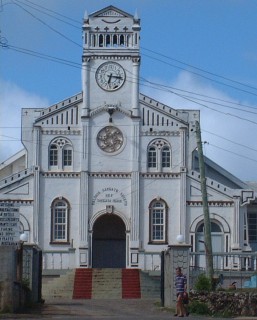 Neiafu's Catholic church is a landmark |
(Jon) It's a bit strange that we spent so much time in
Neiafu, as we're not usually into towns. Neiafu Bay is so deep that
anchoring is difficult, so most people pick up a mooring, which costs
about US$6/night, an excellent way to shoo me away. But the Moorings charter
company had computer problems and were happy to let us use one of their moorings
if I'd keep their computers running. Besides, there were always lots of
friends in Neiafu.
My main impressions of Neiafu are sleepy and polite.
The customs officials were formal as they came onboard in their "pocket sulus"
(basically a knee length skirt, worn by men on formal occasions) and wrapped
further with what appeared to be a woven palm-frond mat tied over their sulus.
They were very apologetic that they had to confiscate our fresh fruit from
French Polynesia, but let us keep a 1-day supply. I got the impression
that they wouldn't have bothered confiscating it if it wasn't hanging in the
netting right above their heads.
The church (several different denominations, but mostly,
Protestants, Mormons and Catholics) is very strong in Tonga. Church
services have no program or hymnals, but everyone knows what to do (except for
us, as everything was said in Tongan). I was impressed that women were
given almost as much time to speak as the men. The singing was amazing,
with complex, multi-part harmony sung by the entire congregation
(men and women often singing different parts) without written aids. It
seemed to start spontaneously, driven by a few key people, but everyone
participated.
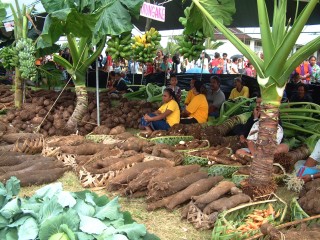 Tongan produce at the agricultural fair |
The Sabbath is observed, well, religiously. In theory, we weren't even supposed to swim on Sunday. I think the church contributed greatly to the Tongans concepts of Right and Wrong. Neiafu was the first place where we didn't bother to lock our dinghy when we went ashore. In the Caribbean, we always locked Tomcat with a steel cable, and twice had our lock cut. Cruisers who did not lift their dinghies out of the water every night had their outboards stolen. In Tonga, nobody would think of taking a dinghy, and the locals would be offended if you locked it. Keys were often left in the ignition of parked cars, but nothing was ever stolen. How would you like to live in a society like that? But it can be taken too far. Our friend Kelcey had a diving accident and got The Bends (nitrogen bubbles in the bloodstream). A custom Lear Jet, outfitted as an ambulance and capable of being pressurized to sea-level, was immediately dispatched from Australia to fly her down to the recompression chambers in NZ, but it was denied permission to land on Sunday. They had to wait until 1am Monday morning.
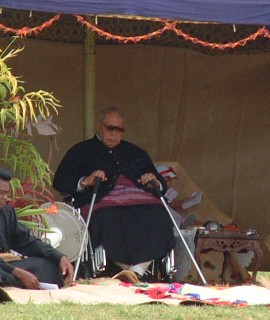 Tonga's King, age 83, was once the world's heaviest monarch |
The sleepy part of Tonga is the Polynesian Island culture.
Life, on a basic level, is pretty easy. Fruits and vegetables grow like
weeds. Nobody needs to work too hard and they don't have the western
work-ethic to get ahead or build a better life for themselves or their family.
Most Tongans work just hard enough to feed themselves today, and don't
worry about tomorrow. So there is virtually no economy. The few
businesses usually have a palangi (foreigner) behind them, but Indians,
perhaps the most vigorous businessmen around (and definitely the driving
economic force in Fiji) are not allowed in Tonga.
A further detriment to the economy is the Royal Family.
Tonga is a kingdom, with a large hoard of Royals. The Royals seem to have
no concept of "Noblesse Oblige", that they have an obligation to their subjects.
They seem interested only in lining their own pockets.
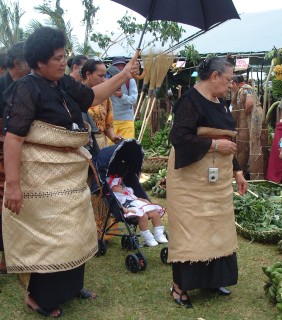 The Tongan Queen and her attendants at the agricultural fair |
Case-in-Point: Soon after we arrived, the internal (government) airline went bankrupt. All international flights come into Nuku'alofa, but most tourist activities are in Vava'u. With the airline out and tourist season approaching, you would have thought the Royals would do everything they could to preserve the fledgling tourist industry in Neiafu, but no. One of the Fijian airlines offered to step in immediately to keep the planes flying, but the Royals stopped them until their "cut" could be arranged. Finally, the Crown Prince bought a vintage DC3 (c.1944) and started flying that. Another airline started flying shortly afterwards, using a more modern Dash-8 that could make the trip in half the time. The Crown Prince simply removed their business license and then jacked up his prices - not a good way to provide the best service to the people (or to encourage external investment). The Crown Prince also owns the only brewery in Tonga, producing an expensive beer called Ikale. It's often called Ik-Ale, as quality is terrible and there's often white sediment in the bottom of the bottles. But nobody can open a competing brewery as the Royals would just shut them down.
Top Level: Home | Destinations | Cruising Info | Underwater | Boat Guests | Ocelot | Sue | Jon | Amanda | Chris | Site Map | Make a Comment
|
If our information is useful, you can help by making a donation |
Copyright © 2000‑ Contact: Jon and Sue Hacking -- HackingFamily.com, svOcelot.com. All rights reserved.